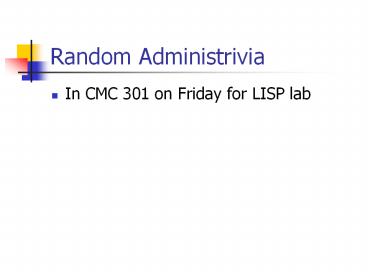Random Administrivia PowerPoint PPT Presentation
Title: Random Administrivia
1
Random Administrivia
- In CMC 301 on Friday for LISP lab
2
Artificial Intelligence Introduction
- What IS artificial intelligence?
- Examples of intelligent behavior
3
Definitions of AI
- There are as many definitions as there are
practitioners. - How would you define it? What is important for a
system to be intelligent?
4
Four main approaches to AI
- Systems that act like humans
- Systems that think like humans
- Systems that think rationally
- Systems that act rationally
5
Approach 1 Acting Humanly
- AI is The art of creating machines that perform
functions that require intelligence when
performed by people (Kurzweil) - Ultimately to be tested by the Turing Test
6
The Turing Test
- Picture
- Demonstrations of software
- http//ds.dial.pipex.com/town/avenue/wi83/eliza/
(1965) - Megahal finalist in Loebner competition
- Transcripts http//www.loebner.net/Prizef/hutchen
s1996.txt
7
In practice
- Needs
- Natural language processing
- Knowledge representation
- Automated reasoning
- Machine learning
- Too general a problem unsolved in the general
case - Intelligence takes many forms, which are not
necessarily best tested this way - Is it actually intelligent? (Chinese room)
8
Approach 2 Thinking Humanly
- AI is The automation of activities that we
associate with human thinking, activities such as
decision-making, problem solving, learning
(Bellman) - Goal is to build systems that function internally
in some way similar to human mind
9
Workings of the human mind
- Traditional computer game players typically work
much differently than human players - Massive look-ahead, minimal experience
- People think differently in experience, big
picture, etc. - Cognitive science tries to model human mind based
on experimentation - Cognitive modeling approach tries to act
intelligently while actually internally doing
something similar to human mind
10
Approach 3 Thinking rationally
- AI is The study of the computations that make
it possible to perceive, reason, and act
(Winston) - Approach firmly grounded in logic
- I.e., how can knowledge be represented logically,
and how can a system draw deductions? - Uncertain knowledge? Informal knowledge?
- I think I love you.
11
Approach 4 Acting rationally
- AI is The branch of computer science that is
concerned with the automation of intelligent
behavior (Luger and Stubblefield) - The intelligent agent approach
- An agent is something that perceives and acts
- Emphasis is on behavior
12
Acting rationally emphasis of this class (and
most AI today)
- Why?
- In solving actual problems, its what really
matters - Behavior is more scientifically testable than
thought - More general rather than imitating humans trying
to solve hard problems, just try to solve hard
problems
13
Recap on the difference in approaches
- Thought vs. behavior
- Human vs. rational
14
History of AI
- Its in text and very cool, read it
- Sections 1.2-1.3
15
What well be doing
- LISP Programming
- Intelligent agents
- Search methods, and how they relate to game
playing (e.g. chess) - Logic and reasoning
- Propositional logic
16
What well be doing
- Uncertain knowledge and reasoning
- Probability, Bayes rule
- Machine learning
- Neural networks, decision trees, computationally
learning theory, reinforcement learning
17
What we wont be doing in class (but you can for
project)
- HAL
- Robotics
- Natural language processing (Jeffs class in the
spring) - Building Quake-bots
18
The Lisp Programming Language
- Developed by John McCarthy at MIT
- Second oldest high level language still in use
(next to FORTRAN) - LISP LISt Processing
- Common Lisp is todays standard
- Most popular language for AI
19
Why use Lisp?
- Everything's a list
- Interactive
- Symbolic
- Dynamic
- Garbage collection

